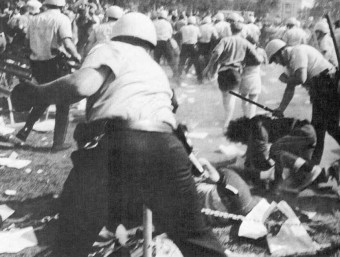This Day in History: August 28th- The Battle of Michigan Avenue
This Day In History: August 28, 1968
 “If you’re coming to Chicago, be sure to wear some armor in your hair.” – The Chicago Seed – alternative newspaper
“If you’re coming to Chicago, be sure to wear some armor in your hair.” – The Chicago Seed – alternative newspaper
On August 28, 1968, growing opposition to the war in Vietnam came to a head inside and outside the International Amphitheatre in Chicago. The Democratic National Convention in 1968 was one of the first times American politicians en masse officially questioned the idea of knee-jerk invasions to stop the spread of Communism, no matter the cost.
Democratic delegates were split on the issue, causing a serious rupture in the party. Those supporting Eugene McCarthy, the firmly anti-war candidate, strongly challenged the assumption that the U.S. should remain engaged in the war. As the debate became more heated, fighting broke out, and the fighting escalated to rolling-on-floor brawling. (The status quo eventually won the field, as sitting Vice-President Hubert Humphrey took the nomination.)
Outside, people had come from all over the country to protest the Vietnam War and show support for Eugene McCarthy. As Lennie Davis, the project director for the National Mobilization Committee to End the War in Vietnam, said at the outset, “Many of our people have already gone beyond the traditional electoral processes to achieve change. We think that the energies released…are creating a new constituency for America. Many people are coming to Chicago with a sense of new urgency, and a new approach.”
Tom Hayden said protest organizers worked for months in advance of the protests to secure permits from the city of Chicago to march, rally, and camp in the parks. “We were used to the idea that authorities would stall on permits, but I think some of us thought that the permits would come through at the end, so we went forward,” he said.
However, mayor Daly wouldn’t issue permits, but he did take the time to round up 12,000 cops, 6,000 soldiers and 6,000 members of the National Guard. There was next to nothing the protesters could do without breaking the law, so the police came at them with gas and clubs. They even attacked members of the media and physicians who jumped in to assist the wounded. A federal commission later classified their behavior as a police riot. It became known forevermore as the Battle of Michigan Avenue.
One of the worst episodes of violence occurred outside Conrad Hilton Hotel on August 28. It also got the most coverage because most of the news media was based there during the convention. CBS engineer Fred Turner reported the events as they occurred from his vantage point on the fifth floor:
“Now they’re moving in, the cops are moving and they are really belting these characters. They’re grabbing them, sticks are flailing. People are laying on the ground. I can see them, colored people. Cops are just belting them; cops are just laying it in. There’s piles of bodies on the street. There’s no question about it. You can hear the screams, and there’s a guy they’re just dragging along the street and they don’t care. I don’t think … I don’t know if he’s alive or dead. Holy Jesus, look at him. Five of them are belting him, really, oh, this man will never get up.”
If you liked this article, you might also enjoy our new popular podcast, The BrainFood Show (iTunes, Spotify, Google Play Music, Feed), as well as:
- Why the Viet Cong Were Called “Charlie”
- The Story Behind the Man Who was Killed in the Famous “Saigon Execution” Photo
- How Did the Cold War Start and End?
- Charlie Chaplin vs. the United States
| Share the Knowledge! |
|





The police may have been out of control at one point, but so was the writer of this article. Have a look at the following (poor excuse for) a sentence, quoted from the story:
“However, mayor Daly wouldn’t issue permits, but he did take the time to round up 12,000 cops, 6,000 soldiers and 6,000 members of the National Guard.”
1. One should avoid starting a sentence with, “However,” if at all possible (and it was possible in this case).
2. One should not alternate conflicting expressions by mixing “However” and “but” in the same sentence (as happened in this case).
3. The “m” in “Mayor” should have been capitalized, but it was not.
4. The Mayor’s first name (Richard) should have been given, but it was not.
5. The Mayor’s surname (Daley) should not have been misspelled (Daly), but it was.
6. The actions taken by Mayor Daley to stop the law-breakers should not have been mentioned sarcastically.
7. More accurate numbers should have been given, as a major news source has reported: “Outside the official convention proceedings, anti-war demonstrators clashed with 11,900 Chicago police, 7,500 Army troops, 7,500 Illinois National Guardsmen and 1,000 Secret Service agents over 5 days.”
8. The author should have emphasized that, although some people enforcing the law lost their composure, the REAL people at fault were the protestors. As even the left-wing news outlet, CNN, states online: “The violence centered on two things: the Chicago police forcing protesters out of areas where they were not permitted to be; and protesters clashing with police, and their reinforcements, as they tried to march to the convention site.”
All of the above errors should have been corrected, before publication, by the writer or the owner/editor of this site. Tragically, both people failed us readers.
I sometimes think we live in crazy times, but I guess they’re always crazy. What could be crazier than 1968? The assassinations of Robert Kennedy AND Martin Luther King were only part of the chaos. Thanks to Kathy Padden for posting this.